PHOTO
The National Transportation Safety Board (NTSB) on Wednesday plans to review oversight of Boeing after a 737 MAX 9 mid-air emergency in January raised serious safety questions.
The board is holding the second day of an investigative hearing into the door panel blowout in the new Alaska Airlines jet after the first day focused on Boeing actions before the incident.
NTSB Chair Jennifer Homendy said the board wants to know why the Federal Aviation Administration (FAA) did not take action earlier.
"We have a lot of questions -- there was information known," Homendy said about FAA oversight of Boeing, citing defects, missing and incorrect documents, as well as incorrect policies that "have been issues for years. This is not new."
Homendy has questions about FAA audit procedures and whether Boeing previously received advance notice of reviews and asked if they were too focused on reviewing paperwork.
After the incident, the FAA barred Boeing from expanding production beyond 38 planes per month and announced a 90-day review of the planemaker and has required significant quality and manufacturing improvements before it will allow the planemaker to hike production.
FAA Administrator Mike Whitaker said in June the agency was "too hands off" in Boeing oversight. The FAA's approach before the mid-air accident was "too focused on paperwork audits and not focused enough on inspections," Whitaker added.
The FAA said Tuesday that "this is not business as usual for Boeing and we will continue to hold them accountable. The company must fix its systemic safety and quality-control issues."
Last week Senate Commerce Committee chair Maria Cantwell and Senator Tammy Duckworth introduced legislation to review and strengthen safety management systems at the FAA.
Cantwell asked the FAA to conduct a thorough review into its oversight of Boeing and said the FAA conducted a combined total of 298 audits of Boeing and fuselage supplier Spirit AeroSystems over the prior two years before the January accident that "did not result in any enforcement actions."
"Clearly, they were doing an audit that meant nothing, because it didn't detect any problems and they said everything was fine," Cantwell said.
(Reporting by David Shepardson; Editing by Michael Perry)





















